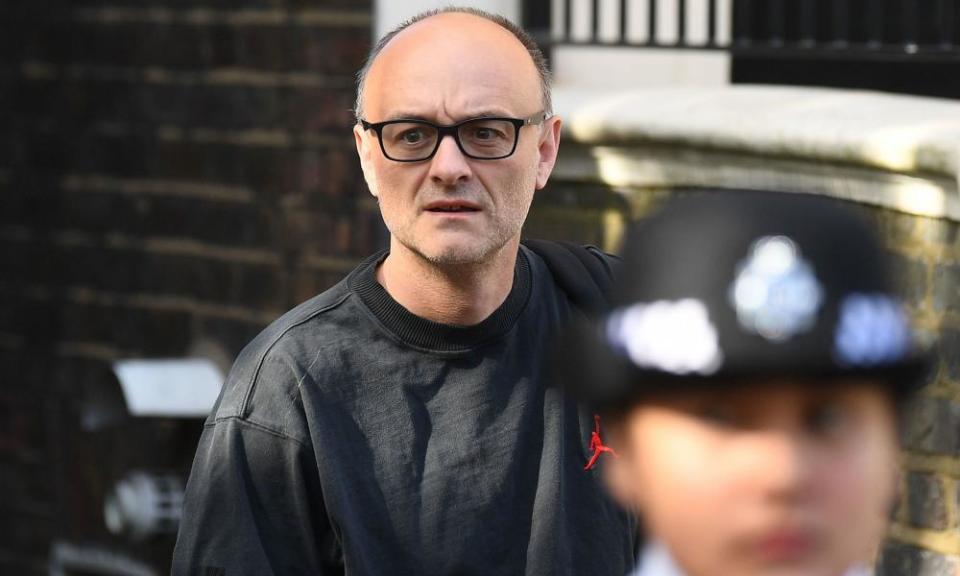Dominic Cummings potentially broke lockdown rules, say Durham police

Dominic Cummings’ family trip to Barnard Castle potentially broke lockdown rules and would have led to police telling him to turn around had he been stopped, Durham police have concluded.
A police examination of the facts surrounding Cummings’ time in the north-east, 260 miles (420km) from his London home, has said no further action will be taken, with the force saying they will not retrospectively issue fines.
Cummings had vehemently denied any wrongdoing following an investigation by the Guardian and the Daily Mirror, and has received the full backing of Boris Johnson, who has urged politicians and the public to “move on” from the crisis.
But Labour accused Cummings of “[breaking] the rules he helped to write” while the former chief constable of Durham police said the report did not get the prime minister’s chief aide off the hook. Mike Barton said the findings from the force he commanded until last year were clear and damning, adding: “This is not an exoneration.”
Cummings’ 52-mile round trip to the beauty spot of Barnard Castle on 12 April from his family’s Durham farm has been assessed by police as a potential minor breach of health protection regulations. He has said he made the journey with his wife and son to test his eyesight ahead of his drive back to London the following day.
The statement by Durham police says Cummings did not break the law when he drove from London to Durham on 27 March but it makes clear that police did not consider whether it breached government guidance to “stay at home”.
The statement said: “Durham constabulary have examined the circumstances surrounding the journey to Barnard Castle (including ANPR [automatic number plate recognition], witness evidence and a review of Mr Cummings’s press conference on 25 May 2020) and have concluded that there might have been a minor breach of the regulations that would have warranted police intervention. Durham constabulary view this as minor because there was no apparent breach of social distancing.
“Had a Durham constabulary police officer stopped Mr Cummings driving to or from Barnard Castle, the officer would have spoken to him, and, having established the facts, likely advised Mr Cummings to return to the address in Durham, providing advice on the dangers of travelling during the pandemic crisis. Had this advice been accepted by Mr Cummings, no enforcement action would have been taken.”
Nick Thomas-Symonds, the shadow home secretary, said:“The police have confirmed what we all knew, that Dominic Cummings broke the rules he helped to write. The country cannot afford for this saga to carry on. Only Boris Johnson can draw a line under it.
“Keir Starmer has said that if he was prime minister, he would have sacked Dominic Cummings. Boris Johnson should follow that advice. If he does not act then he will send a clear message that there is one rule for his closest adviser and another for the British people.”
Continuing to back Cummings, a No 10 spokesman said: ‘The police have made clear they are taking no action against Mr Cummings over his self-isolation and that going to Durham did not breach the regulations.
“The prime minister has said he believes Mr Cummings behaved reasonably and legally given all the circumstances and he regards this issue as closed.”
In their statement Durham police said of Cummings’ decision to drive from London: “Durham constabulary does not consider that by locating himself at his father’s premises, Mr Cummings committed an offence contrary to regulation 6 of the Health Protection (Coronavirus, Restrictions) (England) Regulations 2020. (We are concerned here with breaches of the regulations, not the general government guidance to ‘stay at home’).”
default
Barton said of Cummings’ drive to Barnard Castle: “They would have told him to go home and if he refused they would have fined him.”
He said the police statement on Cummings’ journey from London to the north-east contained thinly coded criticism: “They are [in effect] saying he broke the guidance to stay at home, but not the regulations that were put into law. But clearly he has flouted the government plea to stay at home.”
On Monday, Cummings admitted he had driven with his family to Durham. He also admitted to the Barnard Castle trip and said he got out of the car near the River Tees for up to 15 minutes. He said he wanted to test his eyesight and whether he was fit enough to make the long drive back to London.
The force had carried out an exercise to establish the facts. It was asked to do so on Monday morning by Steve White, the acting police, crime and victims’ commissioner for Durham, who oversees the force.
On Friday the Guardian and the Daily Mirror revealed Cummings had driven from his London home to his parents’ property in Durham on 27 March, at a time when the public were being told to stay at home to stop the spread of the coronavirus.
The Durham inquiry said there was “insufficient evidence” to back claims that Cummings was in Durham again on 19 April, and that the prime minister’s top aide had denied it.
Durham police have been among the forces least likely to take enforcement action for lockdown breaches and they said: “In line with Durham constabulary’s general approach throughout the pandemic, there is no intention to take retrospective action in respect of the Barnard Castle incident since this would amount to treating Mr Cummings differently from other members of the public. Durham constabulary has not taken retrospective action against any other person.”
Its chief constable, Jo Farrell, acted after receiving a letter from White asking her to look at all the claims about Cummings’ time in Durham.
As part of their inquiry Durham police visited and took a statement from Robin Lees, a retired chemistry teacher, who had seen Cummings at Barnard Castle.

 Yahoo News
Yahoo News 